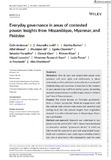| dc.contributor.author | Anderson, Colin | |
| dc.contributor.author | Joshi, Anuradha | |
| dc.contributor.author | Barnes, Katrina | |
| dc.contributor.author | Ahmed, Affaf | |
| dc.contributor.author | Ali, Mudabbir | |
| dc.contributor.author | Chaimite, Egidio | |
| dc.contributor.author | Forquilha, Salvador | |
| dc.contributor.author | Khan, Danyal | |
| dc.contributor.author | Khan, Rizwan | |
| dc.contributor.author | Loureiro, Miguel | |
| dc.contributor.author | Myanmar Research Team | |
| dc.contributor.author | Posse, Lucio | |
| dc.contributor.author | Rowlands, Jo | |
| dc.contributor.author | Shankland, Alex | |
| dc.coverage.spatial | Pakistan | en |
| dc.coverage.spatial | Mozambique | en |
| dc.coverage.spatial | Myanmar | en |
| dc.date.accessioned | 2023-01-03T16:41:08Z | |
| dc.date.available | 2023-01-03T16:41:08Z | |
| dc.date.issued | 2022-12-05 | |
| dc.identifier.citation | Anderson, C.; Joshi, A.; Barnes, K.; Ahmed, A.; Ali, M.; Chaimite, E.; Forquilha, S.; Khan, D.; Khan, R.; Loureiro, M.; Posse, L.; Rowlands, J. and Shankland, A. (2023) 'Everyday Governance in Areas of Contested Power: Insights from Mozambique, Myanmar and Pakistan', Development Policy Review, 2023;00:e12683, DOI: 10.1111/dpr.12683 | en |
| dc.identifier.uri | https://opendocs.ids.ac.uk/opendocs/handle/20.500.12413/17818 | |
| dc.description.abstract | How do poor and marginalized people solve problems and claim rights and entitlements in places affected by conflict and where state authority is contested? Understanding such processes is important as the numbers of poor people living in difficult settings grows, yet existing research on governance in conflict largely misses a “citizen’s eye” view of these processes.
The article focuses on “everyday governance” from a citizen’s perspective. What do engagements with the multiple state and non-state actors that prevail in such settings look like? We present insights from longitudinal research in conflict-affected areas in Mozambique, Myanmar and Pakistan.
Research was undertaken in two phases over the period 2017–2021. Researchers developed an innovative method, “governance diaries,” in which we interviewed the same set of poor and marginalized households over a period of a year, capturing an unfolding citizen’s eye view of governance. We subsequently used the same method to include key intermediaries to whom households went with problems.
We find that in most instances poor and marginalized households did not rely on the state or other formal or external authorities to resolve problems. Mostly, they simply “lived with” those problems, or resolved them through “self-provision” — mutual aid, and community action. When they did go to authorities, they used “governance intermediaries”—actors that connect people with authorities or mediate between households. These intermediaries played a central role in local governance, using their networks and deploying a range of strategies with a focus on local resolution of problems.
These findings challenge some core assumptions of contemporary development practice. First, development programmes tend to focus on improving state-run services, rather than engaging with the diversity of how public goods are governed on the ground. Second, policies assume that people can go directly to authorities with their problems, and do not take into account the role that
intermediaries play. Finally, the highly diverse networks of governance actors that matter to specific places challenges the common focus on formal systems rather than informal practices. | en |
| dc.language.iso | en | en |
| dc.publisher | John Wiley & Sons Ltd | en |
| dc.rights.uri | http://creativecommons.org/licenses/by/4.0/ | en |
| dc.subject | Governance | en |
| dc.title | Everyday Governance in Areas of Contested Power: Insights from Mozambique, Myanmar and Pakistan | en |
| dc.type | Article | en |
| dc.rights.holder | © 2022 The Authors. Development Policy Review published by John Wiley & Sons Ltd on behalf of ODI | en |
| dc.identifier.externaluri | https://onlinelibrary.wiley.com/doi/10.1111/dpr.12683 | en |
| dc.identifier.team | Power and Popular Politics | en |
| dc.identifier.doi | 10.1111/dpr.12683 | |
| dcterms.dateAccepted | 2022-12-05 | |
| rioxxterms.funder | Department for International Development | en |
| rioxxterms.funder | Default funder | en |
| rioxxterms.identifier.project | PO7239 Action for Empowerment and Accountability Programme | en |
| rioxxterms.identifier.project | sida | en |
| rioxxterms.version | AM | en |
| rioxxterms.versionofrecord | 10.1111/dpr.12683 | en |
| rioxxterms.funder.project | 01e10511-513a-43f3-ad45-97d8cb13bae0 | en |
| rioxxterms.funder.project | 3f32bc13-1f3c-47d3-9de7-8df640669d8f | en |


